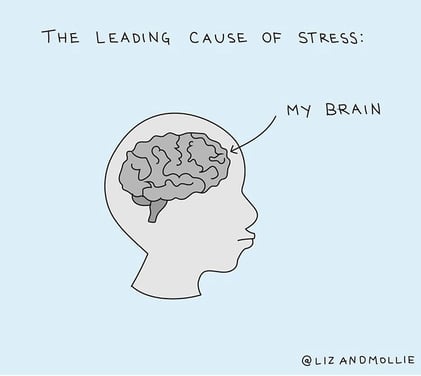Life can get busy. Work, more work, family obligations, school, and the list goes on. Overwhelm from all the responsibilities creates stress. Stress makes relaxation and having mental perspective difficult to access. I have seen in my New York psychotherapy practice how important taking the time to de-stress and relax is to gain the perspective needed to make healthy and meaningful life decisions. Here are some novel and effective ways to relax. You can even bring the family along.
3 Ways to Relax and Find Perspective
1. Getting out in nature
Does nature help mental health?
It can be hard to make or find the time to connect with nature, or even to find the nature if we do make the time. In big cities such as New York and Los Angeles people are without access to larger green spaces unless the own a car. Why is it important? Research shows that exposure to the outdoors can have positive and profound affects on mental outlook, mood and physical health. One recent study showed that just a 30 minuted walk in nature each week had a significant impact on mood. Another study showed just ten minutes sitting or walking in nature had a positive impact on emotional wellbeing!
As we become more connected to the world and each other through our smart phones and devices, what does that mean for our connection to nature?
Journalist and child advocacy expert, Richard Louv argues that there is an unhealthy divide between children and the outdoors. With his critical acclaimed books, Last Child in the Woods, Nature Principal, and Vitamin N, he helped launch an international movement to connect children and their families to nature.
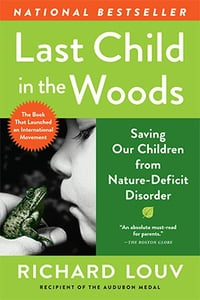 |
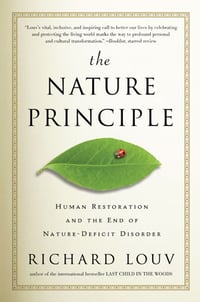 |
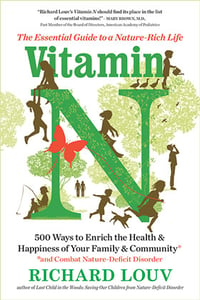 |
The author directly links the lack of nature in the lives of today's wired generation—he calls "nature-deficit"—to some of the most disturbing childhood trends, such as the rises in obesity, attention disorders, and depression.
The future will belong to the nature-smart—those individuals, families, businesses, and political leaders who develop a deeper understanding of the transformative power of the natural world and who balance the virtual with the real. The more high-tech we become, the more nature we need.”
—RICHARD LOUV

Being in nature allows us to get out of our head and into our body. It can build perspective because it reminds us how small we are and how big the world around us is. As the weather gets warmer and the days get longer we might feel a pull to be outside more. Looking at the ocean, walking in the woods, working in a garden, playing sports or engaging in physical activity outside are all great ways to engage with nature.
Does being nature help with stress?
Spending time in nature does help with lowering stress. There are studies showing the positive impact nature has on many aspects of stress: feeling disconnected, depressed, anxious and fatigued.
Read Our Blog
2) Learning Something New
Explore New Places
Another great way to de-stress, relax and gain mental perspective on your life is to do something new. Exploring novel environments help us create good stress-the excitement of learning something new-that ultimately helps the bad stress of being in that anxious or fear response chronically reset.
Going to new places can also shake up our routine. Maybe it's a walk in a different neighborhood or a road trip to a city or park you have never experienced. Experiences that are new and different can help us gain perspective by seeing what else is out there, who else is out there, and how they live. It can be inspiring and invigorating.

Learn a New Skill
One form of brain training is learning something new, whether it is juggling or how to play the piano. Research shows that the novelty enhances brain performance and also contributes to anti-aging. New neural (brain) pathways are formed when we learn a new skill.
Learning a new skill, especially if it makes us focus, has a moderate degree of challenge, contributes to having a 'peak' experience. Peak performance experiences happen in moments when learning something new when the learner experiences a sense of ease, where the body and mind feel synchronized.
When people learn and have some degree of mastery it is often accompanied by a good feeling and sense of accomplishment. When learning a new skill does not contribute to feeling relaxed and mental perspective is when the individual is overly fixated on a particular outcome. We often call that being a 'perfectionist.' Setting the goal too high, then inevitably experiencing frustration and disappointment is not a healthy approach.
READ MORE
Is Peak Performance Accessible to Anyone?
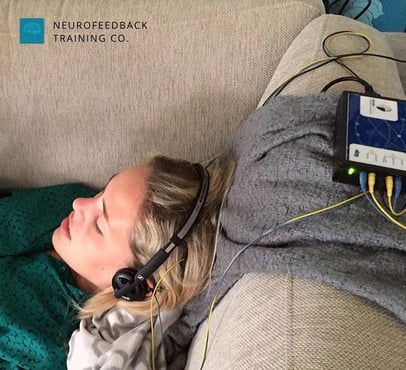 3) Neurofeedback
3) Neurofeedback
Reduce your stress by teaching the automatic-functioning brain to reset
Neurofeedback, also known as EEG biofeedback or brain training, is the latest technology to help the brain reset out of the stress response and into relaxation and mental clarity. Many people do not realize that being 'stressed out' is a decision, or series of decisions, made by the automatic functioning brain. This is a part of the brain that we do not consciously control, yet makes many decisions for us each hour and throughout the day.
This part of the brain is not under our conscious control because it is meant to be able to make decisions in less than a second in order to keep us safe. We know it as the 'fight/flight/freeze' response. Being 'stressed out' is when that autopilot brain is in the habit of thinking their is ever-present danger. And when it senses danger, it is very hard to relax.
NeurOptimal® neurofeedback is an advanced brain training technology developed over 20 years ago by clinical psychologists to help the brain reset itself. This technology is letting the brain see its habituation to the stress response, and because we are not always in danger, in fact we rarely are, the brain will naturally reset itself.
Neurofeedback can be a safe and effective way to help the brain relax, while we work on creating balance in our lifestyles.
I have referred many of my clients to add neurofeedback to their plan for stress reduction and when they are trying to create focus and mental clarity. The reason I recommend it is that because the stress response is an unconscious habit, and it does not take orders from the willful, conscious part of the brain, also known as the frontal lobes. This inability to be in charge of our automatic brain can make the process of changing our stress levels frustrating and slow.
Why can't I get off the couch? Why am I still eating sugar when I'm upset? Why am I anxious when I am trying to relax? These are common frustration when we try to change that automatic brain with our willful brains. Brain training with neurofeedback helps because it is designed to send feedback directly to that automatic brain so it can 'see for itself' that there is no danger in the present moment, allowing it to make its own decision to reset.
LEARN MORE:
Is Neurofeedback Safe?
What to expect when brain training with NeurOptimal®?
Before a session, client fills out a Checklist of Concern which keeps track of ones progress. During a session, sensors are placed on the head and ears. The client sits in a comfortable chair and listen to audio feedback through a song. It's very relaxing and no conscious effort from clients is needed.
How you will see the effects is different for everyone but most feedback we hear from clients are that they feel calmer, feel more focused, sleep better, and have an enhanced sense of their thought patterns and how they get stuck.
The ability to have mental focus is a common outcome from brain training. This makes sense when you understand that having a lot of stress means the brain is in a state of hyper-arousal. We know that as feeling anxious, having speedy thoughts, and an inability to stop and focus. This is the brain being in the fight/flight brainwave habit.
When the brain registers safety in the present moment through the brain training process, it will then shift to being flexible and creating focusing brainwaves when there is a task that requires that skill. Mental focus then allows us to be open and gain clarity about our lives and our priorities.
Where to Start on the Path to Relaxation?
I always advise my clients to come up with a stress reduction plan, and to then break it down into doable next steps. Often people when under stress, create a list of 'to-dos' for creating a balanced lifestyle but then only flood themselves because it is too much to take on all at once.
Here is a series of questions to ask yourself to create your plan for greater relaxation.
- What is the most stressful part of my day and what is one thing that would help it be less stressful?
- When do I feel the most relaxed? Name three things that lead to feeling calmer? Can I add one more of those each week?
- Where is one place that makes me feel relaxed? Can I spend an hour there each week?
- If I was going to add one outdoor outing into nature this week where would I go? Who would I invite to go with me?
Don't give up on yourself. Creating change from being stressed to having a more balanced lifestyle is possible. The key is to have reasonable expectations for the timeframe, and a doable next step each day.
Please reach out if you would like help creating a stress-reduction plan for yourself.



